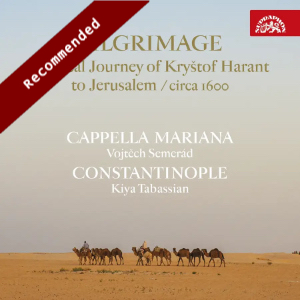
Pilgrimage: The Musical Journey of Kryštof Harant to Jerusalem circa 1600
Cappella Mariana/Vojtěch Semerád
Constantinople/Kiya Tabassian
rec. 2018-2023
Supraphon SU4350-2 [75]
This unique, fascinating album offers us the complete works of Kryštof Harant of Polžice and Bezdružice. He was born in 1564, the same year as Shakespeare, Marlowe and Galileo Galilei. He was the most significant Czech composer during the reign of King Rudolf II. This programme has also been guided by a travelogue which the composer compiled while on his extraordinary visit to the Holy Land in 1588. Its snappy title is this: Journey from the Kingdom of Bohemia to Venice. From there to the Holy Land, Judea and to Egypt, later to Mount Horeb, Sinai and Saint Catherine’s Monastery in Desert Arabia.
The only surviving music by this little-known figure (at least, unfamiliar in the UK) is what was published in his lifetime: the Missa quinis vocibus, the motet Qui confidunt, the Marian motet/hymn Maria Kron (his only known work in the vernacular), and another motet Dies est laetitiae. Whatever else he composed was destroyed after his public execution in the old town square in Prague. He had been part of an uprising against the authorities, even if he came from a privileged, aristocratic family.
But the disc also features what we might term exotic music. Harant could well have been fascinated by it as he travelled east. The Cappella Mariana, who sing the polyphony, are complemented by the group simply named Constantinople. They perform pieces from 16th and 17th Century Ottoman, Persian and Post-Byzantine manuscripts. There are also other traditional songs and dances. This juxtaposition has therefore helped create in our imaginations the journey which Harant and other Christians – destined for a pilgrimage at the end of the Renaissance period – could have encountered.
The booklet contains three fascinating essays, illustrations from Harant’s book, and photos of desert landscapes – the sort of thing the composer and his entourage might have seen. The first essay is A pilgrimage; or journey without borders. The second, Building Bridges, discusses the concept of juxtaposing Muslim song with classic renaissance polyphony: ‘linking the cultures and peoples’, writes director Kiya Tabassian. The Life and Pilgrimage of the Czech nobleman Krystof Harant is a biography of the composer and his background. Western-Eastern Renaissance, the third, longest essay is devoted to the music and the poetry by Martin Putna. It and briefly mentions Sufi mysticism as represented in the work of the Persian poet Hafez or Hafiz (d.1390). We also get more of an idea of the story behind of the travel book.
The performances are totally convincing. The six singers of Cappella Mariana beautifully shape Harant’s music; the singers’ clear intonation and diction convey the often very expressive lines. Constantinople wonderfully blend their voices with instruments such as a kemence (which resembles a rebec) and percussion. The artistic director Kiya Tabassian contributes a piece of her own in the tradition of that which Harant would have heard.
Take a particularly pertinent example: track 14. It begins with a psalm to a melody by l’Estocart, and then segues into a piece by Ali Ufki (a Polish musican Wojciech Bobowski, captured and sold to the court of the sultan). The last track is a joyous coming together of the Turkish musicians with a renaissance motet.
The whole concept and execution of this project is thorough, and of musical great interest and appeal. The programme was recorded in three different venues at three different times, but one needs no adjustment to the acoustics and the volume. There are texts in three languages.
Gary Higginson
Buying this recording via a link below generates revenue for MWI, which helps the site remain free


Contents
1. Prologue
2. Anonymous (16th Century)
Tasbih-i-Misri
3. Kryštof Harant (1564-1621)
Missa quinis vocibus: Credo
4. Anonymous (16th Century)
Naqsh Dar Bazm-e Dei [poem by Hafiz]
5. Kryštof Harant
Missa quinis vocibus: Kyrie
6. Kiya Tabassian
Namaz-e Sham-e Ghariban [poem by Hafiz]
7. Kryštof Harant
Missa quinis vocibus: Gloria
8. Shishtari Murad (?-1688)
Chashm-e-Mast
9. Kryštof Harant
Missa quinis vocibus: Sanctus
10. Kâsebâz-I Misti (16th Century)
Pishref-i-Misri & Sama’i
11. Kryštof Harant
Qui confidunt in Domino
12. Seyyid Seyfullah (16th Century)
Bu Ashk Bir Bahri Ummandir
13. Kryštof Harant
Maria Kron
14. Ali Ufki (1610-1675)
Mezmur 2 & 4
Paschal de l’Estocart (c.1538-after 1587)
Psalm 4
15. Kryštof Harant
Missa quinis vocibus: Agnus Dei
16. Kryštof Harant
Dies est laetitiae
Gazi Giray Han (1554-1607)
Mâhur Peşrev
17. Anonymous (16th Century)
Otce Buoha nebeského – Dar Nazar Baziye Ma
Recording locations
The Refectory in the Cistercian Monastery, Osek, Czechia; Saint John the Evangelist Church, Leuven, Belgium; Michna Palace Auditorium, Prague, Czechia

















